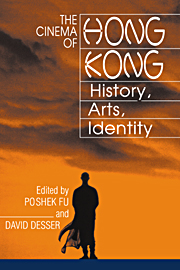Book contents
- Frontmatter
- Contents
- List of Contributors
- Acknowledgments
- Introduction
- Chronology of Hong Kong Cinema
- PART I HISTORY
- PART II ARTS
- PART III IDENTITY
- 9 Between Nationalism and Colonialism: Mainland Émigrés, Marginal Culture, and Hong Kong Cinema 1937–1941
- 10 Urban Cinema and the Cultural Identity of Hong Kong
- 11 Rewriting History: Hong Kong Nostalgia Cinema and Its Social Practice
- 12 Filming Diaspora and Identity: Hong Kong and 1997
- 13 Buying American, Consuming Hong Kong: Cultural Commerce, Fantasies of Identity, and the Cinema
- 14 Hong Kong Electric Shadows: A Selected Bibliography of Studies in English
- Index
12 - Filming Diaspora and Identity: Hong Kong and 1997
Published online by Cambridge University Press: 05 June 2012
- Frontmatter
- Contents
- List of Contributors
- Acknowledgments
- Introduction
- Chronology of Hong Kong Cinema
- PART I HISTORY
- PART II ARTS
- PART III IDENTITY
- 9 Between Nationalism and Colonialism: Mainland Émigrés, Marginal Culture, and Hong Kong Cinema 1937–1941
- 10 Urban Cinema and the Cultural Identity of Hong Kong
- 11 Rewriting History: Hong Kong Nostalgia Cinema and Its Social Practice
- 12 Filming Diaspora and Identity: Hong Kong and 1997
- 13 Buying American, Consuming Hong Kong: Cultural Commerce, Fantasies of Identity, and the Cinema
- 14 Hong Kong Electric Shadows: A Selected Bibliography of Studies in English
- Index
Summary
NARRATIVES OF THE NATION-STATE
As a century and a half of British colonial rule ended in Hong Kong and the island returned to Chinese control on July 1, 1997, the media in the Chinese speaking world was all geared up to celebrate, relish, and comment on the event. There was no lack of visual, televisual, filmic, and artistic representations of the history, past, and present of Hong Kong. Outside Hong Kong, the return to China was most conspicuously glorified in the motherland itself. In the realm of cultural production and consumption, the Hong Kong issue became the main theme in the summer of 1997. TV programming was monopolized by the Hong Kong story, and a flood of soap operas were aired on TV channels across the nation or were under hurried production. The provinces and major cities were required to mark this historic occasion by producing and staging performances, concerts, TV programs, art exhibitions, and plays.
In commemoration of the reversion of Hong Kong, two large-scale, Chinese- made films were advertised and screened in China around the handover day. They were the much publicized The Opium War (Yapian zhanzheng) by the veteran director Xie Jin, and The Red River Valley (Honghe gu), directed by Feng Xiaoning, starring Ning Jing. The lavish, expensive epic film The Opium War recounts the events causing the Opium War in the mid-nineteenth century and the subsequent ceding of Hong Kong to Britain by the Qing Empire.
- Type
- Chapter
- Information
- The Cinema of Hong KongHistory, Arts, Identity, pp. 273 - 288Publisher: Cambridge University PressPrint publication year: 2000
- 6
- Cited by



